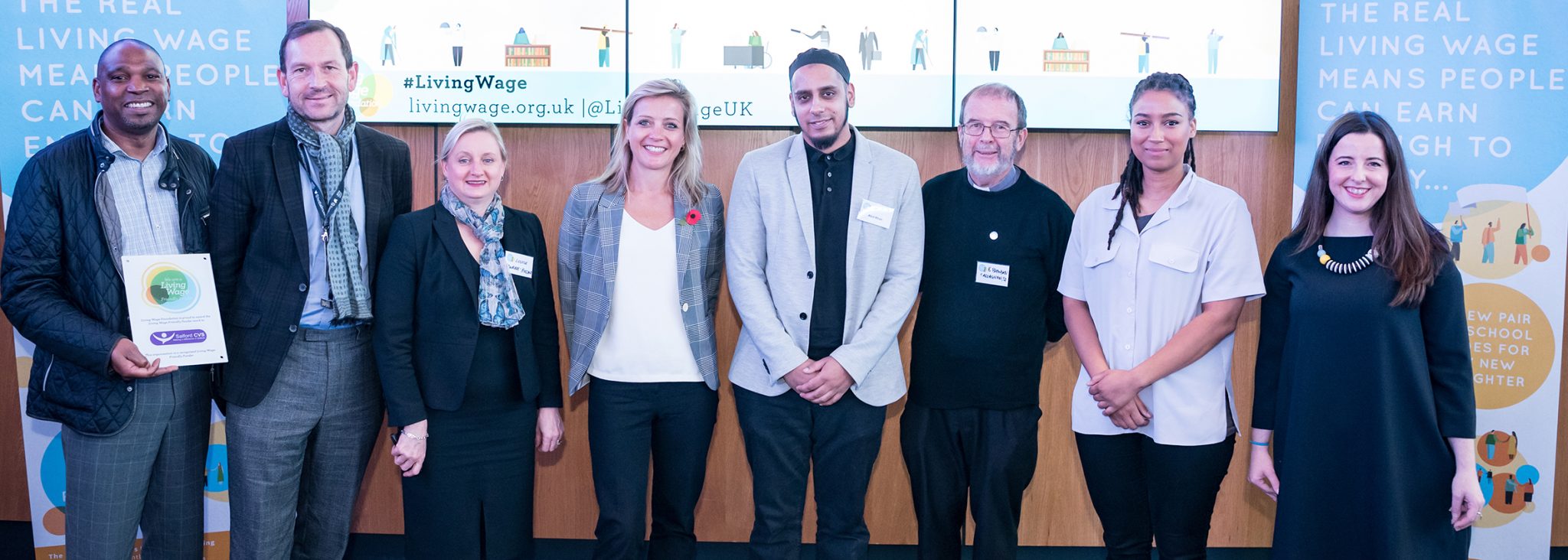What is the real living wage needed to live in the UK? According figures announced in November, it’s a minimum of £9 per hour – or £10.55 per hour if you live in London – for everyone over 18.
These numbers are up from £8.75 (London: £10.20) in 2017, driven by higher transport costs, private rents and council tax feeding through to the basket of goods and services that underpin the rates, which are independently calculated based on what people need to get by.
The real living wage is also significantly higher than the government’s own ‘national living wage’ of £7.83 for those aged 25 and over, and the minimum wage for those aged 21-24 (£7.38) and 18-21 (just £5.90).
The rates are calculated by the Living Wage Foundation, an independent collective of businesses and people who believe that “a hard day’s work deserves a fair day’s pay”. The Foundation “celebrates and recognises the leadership of responsible employers who choose to go further and pay a real living wage based on the cost of living, not just the government minimum”.
“The Living Wage campaign is about tackling the rising problem of people paid less than they need to live,” says Living Wage Foundation director, Tess Lanning. “Responsible businesses know that the government minimum is not enough to live on, and [the] new real living wage rates will provide a boost for hundreds of thousands of workers throughout the UK.”

She added: “Employers that pay the real living wage enable their workers to live a life of dignity, supporting them to pay off debts and meet the pressures of rising bills. We want to see local councils, universities, football clubs, bus companies and the other major public and private sector employers in every city commit to become real Living Wage employers. When they do, thousands of people get a pay rise, but other local employers also follow their lead. If more of these institutions step up, we can start to build true Living Wage places.”
The Foundation provides accreditation to organisations which pay the real living wage to all directly employed staff and have a plan to pay all contractors a real living wage. Over 4,700 employers across the UK are currently accredited, including a third of the FTSE 100 and big household names such as IKEA and Everton FC.
Related: Co-op project tackles youth loneliness among young care leavers
Several co-operatives and credit unions have signed up to the campaign, too, including, the Co-operative Party, Lister Housing Co-op. Eighth Day, the Wales Co-operative Centre and Co-op News, among others.
And it was the Labour and Co-operative Mayor of Manchester, Andy Burnham, who announced the new rates in the city on 5 November. The event was hosted at the National Football Museum, which was accredited this autumn.
“Life has become too hard for people these days, it’s too precarious,” said Mr Burnham. “If people haven’t got enough money to pay the rent, they’re just a few days away from being on the streets. That has to change, and the real living wage can be a part of that change.”

He added that while some may view the real living wage as a burden on businesses, it was in fact about “building good, strong, productive businesses which keep their staff and get more from them” because they’re happier to be at work.
“People are going to say how can we afford it? Well maybe it’s about people at the top of those organisations not taking their pay increase so those at the bottom can have theirs. That’s about building a stronger society and bringing people back together in these divided times.”
He thanked Greater Manchester police, Salford University and Salford police for signing up as a real living wage employers but acknowledged there was more to be done, both in Greater Manchester and beyond. One such action would be to get rid of enforced zero hours contracts.
“I can’t see how, in this day and age, people can have a foundation beneath them to do their best work and run a family home when they can’t be certain what they’re going to earn from one week to the next. It’s time to face up to these things and acknowledge that everybody deserves a real
living wage.”
Related: Co-op Group calls for changes to the apprenticeship levy
Ms Lanning believes that the real living wage should be at the heart of new strategies to drive regional growth, highlighting research, conducted by the Smith Institute, which indicates that if, in ten cities, just a quarter of those on low incomes saw their pay raised to the real living wage, half a million people get a pay rise of over £1,700 a year and the cities’ businesses and wider economies would benefit from an economic boost worth over half a billion pounds, driven by increased productivity and spending.
“To be meaningful, growth must at the very least meet the basic needs of local communities,” she said. “Local and combined authorities can use their powers of planning and procurement to encourage more local employers to commit to ensure their staff earn a real living wage, and make access to business support and skills investment dependent on paying a wage their staff can live on.”
The issue was raised at the 2017 Co-op Group AGM, where members approved a motion that called upon the board to review pay ratios at the organisation from top to bottom, and to set a strategy to narrow the differential between the highest and lowest salaries to “an appropriate level” to reflect the organisation’s co-op principles and ethical approach to business – including progress towards a real living monthly wage for the lowest paid staff.
“This AGM notes that executive pay has increased significantly in the UK, while pay at the bottom for the lowest paid has largely stagnated,” read the motion. “Co-operatives should be operating on a different basis that is more ethical and reflects greater equity within the workforce.
“The Co-operative Group, as a leading co-op in the UK, should be setting the benchmarks which other co-operatives could adopt where appropriate. This ethical approach to pay ratios would be good business and make co-operative sense, reflecting our concern to ensure that our staff are fairly remunerated so as to keep delivering the business performance our society needs if we are to remain the public’s convenience retailer of choice.”
In response, the Group agreed to invest an additional £4m for colleagues working in food stores and funeral homes in 2018. It increased hourly pay rates for customer team members by 6.1% in 2018 so pay starts at £8.02 per hour, and rises to £8.18 per hour plus an extra £0.70 for colleagues based in London.